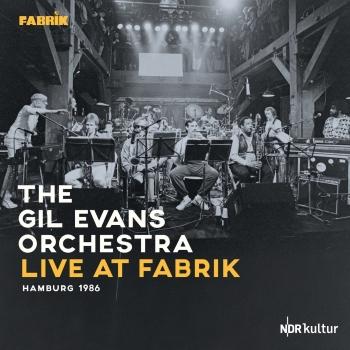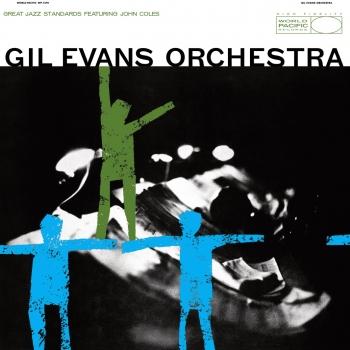
Live at Fabrik Hamburg 1986 (Remastered) The Gil Evans Orchestra
Album info
Album-Release:
1986
HRA-Release:
08.04.2022
Album including Album cover
- 1 Stone Free (Live) 20:06
- 2 Up From The Skies (Live) 10:16
- 3 Little Wing (Live) 18:27
- 4 Subway (Live) 23:52
- 5 There Comes A Time & Birdland (Live) 23:32
- 6 Sometimes (Live) 08:33
- 7 Voodoo Chile (Live) 08:55
- 8 Orgone (Live) 17:12
Info for Live at Fabrik Hamburg 1986 (Remastered)
By the 1980's, Gil Evans Orchestra's repertoire was a distinctive blend of Hendrix tunes, original pieces from band members and the occasional nod to Gil's earlier recordings.
The set at Hamburg includes four songs from the Hendrix book, although just one of these ("Up From The Skies") was part of the original studio album. Regular appearances in Europe meant that the band had now acquired a younger following, such as many in the audience at Fabrik, one well accustomed to it's rock-referent concerts.A year and a half after the concert at Fabrik, Gil Evans passed away in Cuernavaca, Mexico. Quite rightly he'll always be remembered for recording those brilliant, luminous albums with Miles Davis and under his own name, but he had, in fact, led at least three contrasting musical lives. His final years saw him directing his band at a regular Monday night gig at Sweet Basil, New York, so it's fitting that we now have this recording from Hamburg, one that serves as a memorial to his free-spirited later days. With an All Star Musicians Cast.
The Gil Evans Orchestra
Digitally remastered
The Gil Evans Orchestra
Among all the great arrangers of jazz, there was one magician. It was left to Gil Evans to dissolve the rigid big band instrumentation (5-4-4), to make it smaller and at the same time to integrate instruments previously used only in classical music, such as horn, bassoon, oboe or tuba, into orchestral jazz music. And everything that sprang from his pen was surrounded by an aura that no one could escape, least of all Miles Davis. Gil Evans, who did not really belong to this world, who always seemed friendly absent, who adored Hermeto Pascoal above all else, always wandered in childlike wonder through various epochs of jazz, which he animated and renewed with a love of detail, a pronounced sense of orchestral color and stylistic instinct." (mathias rüegg)
Admittedly, it may be somewhat subjective, and at the risk of incurring the lifelong condemnation of Marcel Prawy, but I will say that the most wonderful recording of the Gershwin opera "Porgy & Bess" is that of Gil Evans with Miles Davis (recorded in July and August 1958).
Miles Evans, who, due to his great father's close friendship and affinity with the (over-)great Davis, for the rest of his life had to deal with the burden of a rather, how shall I say it? "Initially, he was interested neither in the music of one of the namesakes nor in the work of the other. Rather, the fact that people like Ray Charles or Stevie Wonder could even afford their own jets, inspired Miles (meaning the godson).
Miles, the godfather, was known to have a soft spot for fast cars, but the red Ferraris roaring around didn't convince Miles, the godson, very much - the rapidly accelerating sports cars might convey a feeling of taking off, but they didn't really want to fly. All the other attempts of the parents in the Evans household to establish a hot connection between (little) Miles and (big) Miles via the usual car enthusiasm of children were ultimately crowned with failure, since father Gil was one of those people who was really happy when he could take advantage of the senior citizens' discount on the New York subway.
But as fate would have it, the Evans apartment was something of an open house for musicians at the time (fate, my ass!): With the "natural", i.e. big band-heavy interests of an arranger, not really a miracle), and little Evans made friends (who knows, maybe the titanic first name was less of a burden than an initial spark) with trumpeters like Hannibal Marvin Peterson, Jon Faddis and Lew Soloff, all of whom were not unwilling to stand in the bandleader's father's pay again and again, and the youngster drew the life-defining, razor-sharp conclusion for himself: "If all the guys who play the trumpet are as nice as these three, then I want to be one too. " The nice guy Soloff lends the 13-year-old his horn, and he starts practicing.
In 1981, Miles Davis launches his comeback. Evans, the teenager, calls him. And Davis, the legendary "grump" (or is it "the saddest trumpeter in jazz"? according to one of jazz's saddest critics), actually gives him a few lessons. Gil Evans, meanwhile, is working in Europe; Davis buys a plane ticket for Miles (no, not for himself!) and sends junior Gil after him. And so it happened, as it had to happen with an appropriate first name: Miles Evans suddenly sat in the trumpet section of his father's ensemble. That was in the mid-eighties, the time when Sting recorded some Jimi Hendrix songs with Gil Evans.
In 1987, the 75-year-old fell ill. His orchestra had already been playing every Monday for years at the ever-crowded Sweet Basil Club. When Gil died a year later, Miles had a stern word with the club owner: he should let the musicians continue to work. What could the club owner have said against it, since he had a band at his fingertips, and the place was always packed.
Miles Evans quickly proved to be a competent bandleader, despite being only 24 years old. In the meantime, the Gil Evans Orchestra has existed in this form for over a decade and has lost none of its quality. With a top-class line-up, the "nice guys" around Soloff and Co are now honoring Vienna for the first time, and who knows, maybe they'll come up with one or two ideas for "Porgy & Bess". But: It ain¹t necessarily so!
This album contains no booklet.












